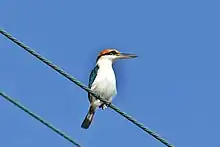Rusty-capped kingfisher
The rusty-capped kingfisher or Palau kingfisher (Todiramphus pelewensis) is a species of bird in the family Alcedinidae. It is endemic to Palau.[2] The natural habitat of this species is subtropical or tropical moist lowland forests. It was formerly considered to be a subspecies of the Micronesian kingfisher.
| Rusty-capped kingfisher | |
|---|---|
 | |
| Scientific classification | |
| Kingdom: | Animalia |
| Phylum: | Chordata |
| Class: | Aves |
| Order: | Coraciiformes |
| Family: | Alcedinidae |
| Subfamily: | Halcyoninae |
| Genus: | Todiramphus |
| Species: | T. pelewensis |
| Binomial name | |
| Todiramphus pelewensis (Wiglesworth, 1891) | |
This is a brilliantly colored, medium-sized kingfisher. Adults are characterized by white underparts with long black eyestripes, while juveniles are cinnamon below. They have large laterally-flattened bills and dark legs. Kingfishers defend permanent territories as breeding pairs and family groups. Both sexes care for young, and some offspring remain with parents for extended periods.[3]
Little has been published about the status of rusty-capped kingfisher populations, although the US Fish and Wildlife Service has bird survey data for the region.[4][5]
References
- BirdLife International (2015). "Todiramphus pelewensis". IUCN Red List of Threatened Species. 2015. Retrieved 25 October 2015.CS1 maint: ref=harv (link)
- "Species factsheet: Todiramphus pelewensis". www.birdlife.org. BirdLife International. 2019. Retrieved 26 May 2019.
- Kesler, Dylan C. (2006). Population demography, resource use, and movement in cooperatively breeding Micronesian Kingfishers (Doctorate thesis). Oregon State University. Retrieved 26 May 2019.
- Kesler, Dylan C.; Haig, Susan M. (May 2007). "Conservation biology for suites of species: Demographic modeling for Pacific island kingfishers". Biological Conservation. 136 (4): 520–530. doi:10.1016/j.biocon.2006.12.023 – via University of Nebraska - Lincoln.
- Kesler, Dylan C.; Haig, Susan M. (May 2007). "Multiscale Habitat Use and Selection in Cooperatively Breeding Micronesian Kingfishers". Journal of Wildlife Management. 71 (3): 765–772. doi:10.2193/2006-011. ISSN 0022-541X.
Further reading
- Fry, C.H., K. Fry, A. Harris. 1992. Kingfishers, Bee-eaters, and Rollers. Princeton University Press. Princeton, NJ.
- Haig, S.M., J.D. Ballou, and N.J. Casna. 1995. Genetic identification of kin in Micronesian Kingfishers. Journal of Heredity 86: 423–431.
- Pratt, H.D., P.L. Bruner, and D.G. Berrett. 1987. The Birds of Hawaii and the Tropical Pacific. Princeton University Press. Princeton, NJ.
- Kesler, D.C., and S.M. Haig. 2007. "Territoriality, prospecting, and dispersal in cooperatively breeding Micronesian Kingfishers." Auk 124:381-395.
- Kesler, D.C., and S. M. Haig. 2005. "Microclimate and nest site selection in Micronesian kingfishers." Pacific Science 59:499-508.
| Wikimedia Commons has media related to Todiramphus pelewensis. |
